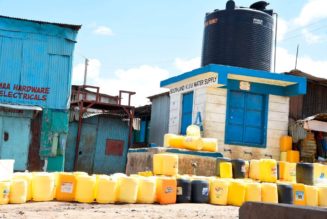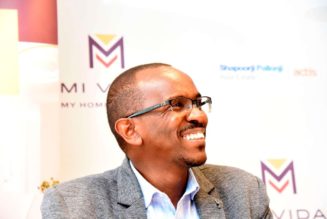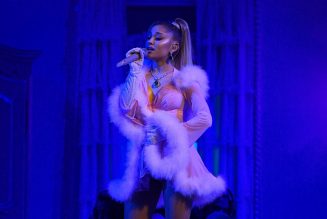Performing Arts
Kenyan ensemble belts out authentic taarab at Paris festival
Saturday June 10 2023
Mbarak Al-Haj, Lelele Africa bandleader, plays the tashkota at a concert on May 17, 2023. PHOTO | FRANCIS NDERITU | NMG
At a time when cultural musical styles have rapidly evolved, an East African genre that is nearly a century old is struggling to retain its identity. Contemporary influences have had a huge impact on taarab music, which today is radically different from what has been the defining sound of the East Coast of Africa for generations.
But there are still a few bands that have retained the unique flavour of the music, rooted in Swahili poetry and rich instrumentation, amid the fusion that has given birth to the heavily synthesised sound of modern taarab.
That resolute determination has critical acclaim for Lelele Africa, a taarab ensemble from Mombasa, which has been selected to represent Kenya at the 26th Festival de l’imaginaire (festival of the Imaginary) in Paris, France.
The festival, which started on June 1 and ends on Sunday, is a celebration of the diversity of artistic expression from around the world through music, dance, and theatre.
“Taarab has changed and musicians now prefer shortcuts, especially the electronic keyboards to create music,” says Mbarak Al-Haj, the group founder.
“But my group still plays the authentic instruments like the accordion, violin, harmonium, tashkota and oud,” adds the veteran composer, singer and multi-instrumentalist.
The group had been preparing for the tour for almost two months and had added some new songs to their repertoire of traditional taarab songs. They were in Nairobi last week performing at a pre-tour concert to showcase their repertoire before leaving for Paris.
Lelele Africa band performs in Nyali, Mombasa in 2022 during a Creative Arts Spaces in Kenya. PHOTO | WACHIRA MWANGI | NMG
Besides the traditional taarab favourites like Kasha Langu, Mbarak has also written some new songs that resonate with the challenges facing the world at the moment. One of those is Mazingira that talks about the impact of climate change with the refrain “joto, joto, joto” while Wewe Mtoto advises children to focus on their education to secure their future in a tough world.
Mbarak is also excited about the reaction to the song Pesa, which he says describes the high cost of living and how ordinary people have to toil all day just to put food on the table.
During Lelele Africa’s performance in Nairobi, the 60-year-old veteran was keen to present the young generation of taarab musicians who can hold the torch for the genre into the future. There are two 20-year-old musicians in the group, his daughter Zainab Mbarak who performed a self-written song Dharau Siwezi and oud player Ahmed Omar who was introduced to the group through his father who also plays the stringed lute-type instrument.
“I will soon hit retirement and so I have this young generation in the group who can attract their peers to keep traditional taarab alive into the future,” says Mbarak. He expects that this trip to France will expose a unique genre of music in its original format to a wider audience
“Even in Mombasa today, most people are surprised to hear our sound because these days at weddings the music has all changed,” he observes.
“The current groups play a type of music that combines taarab with Bongo Flavour, Rumba, even Nigerian music, so anything goes. They don’t compose but just rely on a mix of songs that are already popular.”
Mbarak was born in Faza, Lamu and spent his childhood on the island where his interest in music started at an early age as he played with instruments belonging to two community groups that were stored in their house.
He was influenced by an older brother who composed poetry (shairi) while his mother was a renowned performer during weddings and other cultural events. Mbarak started writing his poems and songs at the age of 12 and by secondary school had already joined a taarab group on the island.
After school, he moved to Mombasa where for three years, he learnt under the legendary bandleader Maulidi Juma, and then formed his first group Diamond Stars in 1995 with Bakari Aziz and Sitara Bute (the singer died in 2011).
Mbarak then joined violinists Seif Omar and Mohammed Awaz, and keyboardist Mohammed Adio to form Lelele Africa in 2011, a name coined from the common ululations of le le le from excited audiences during performances. Both Omar and Awaz died, while Adio left the group, which has survived thanks to bandleader Mbarak who has brought younger musicians into the fold.
In 2006, Lelele Africa was among the groups that were selected during the Spotlight on Kenyan Music (Musical Waves from the Kenyan Coast), an initiative of the Alliance Francaise that provided a launch pad for Nyota Ndogo, Mombasa Taarab, Afro Simba Band and other groups. In 2014 Mbarak was among the musicians who represented Kenya at the Smithsonian Festival in Washington DC.
Lelele Africa is travelling to France as a seven-piece band, along with guest guitarist Eddie Grey and tour manager Tabu Osusa, founder of Ketebul Music, who has worked with the group since the Spotlight project.
Eddie, best known in jazz circles, is grateful for the long association with Lelele Africa, which goes back to working on the Spotlight on Kenyan Music album in 2006.
“We first connected while producing that album at the Ketebul Music studios,” recalls Grey.
“This is a festival with a very cultural niche so it is a very good opportunity for the group to bring a unique sound to the table.”









